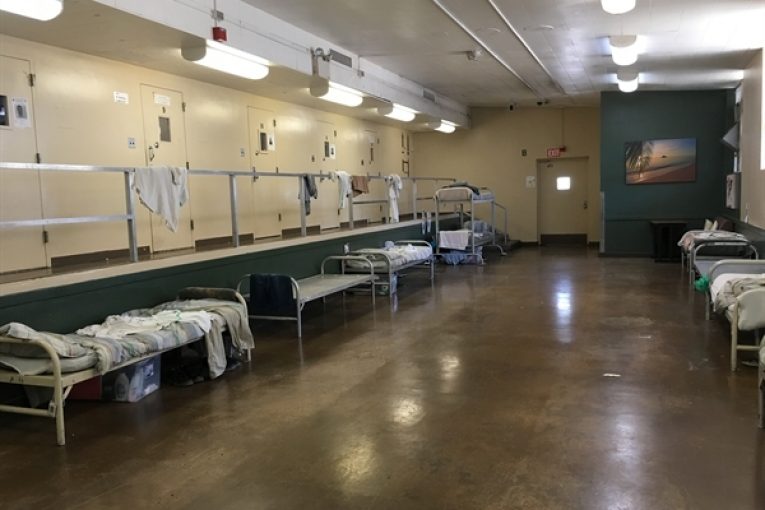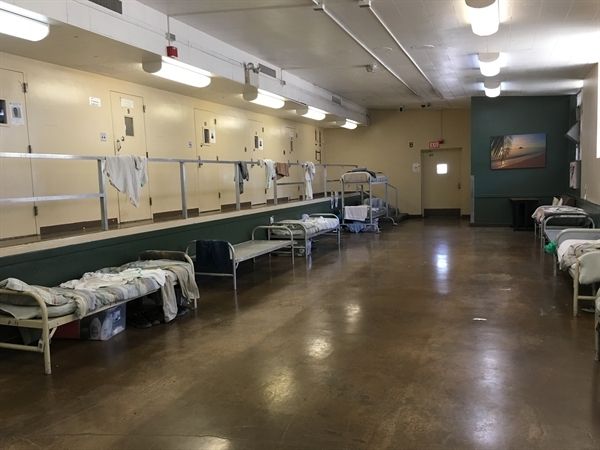

By David M. Greenwald
Executive Editor
COVID has already devastated California’s prisons at times, but the new wave has also reached DJJ (Division of Juvenile Justice). According to sources, more than one-third of those incarcerated at the DJJ facilities have tested positive since November—and with testing lagging, that is almost certainly a low number.
One mother who asked to remain anonymous told the Vanguard, “It’s really hard. That’s my son. My job as a mother is to protect him and make sure he’s safe. My hands are tied.”
According to Nancy Juarez, Communications and Policy Analyst for the Center on Juvenile and Criminal Justice, DJJ is in the midst of a massive COVID-19 outbreak, likely fueled by the Omicron variant.
On January 11, there were more than 145 active infections and a total of 238 youths have tested positive.
“That’s more than 1 in 3 youth in the facilities,” she said. “Youth at DJJ are highly susceptible to  COVID-19 given its tightly packed and poorly ventilated living units. Since the weekend, we’ve seen a huge spike in cases with more than 100 youth testing positive.”
COVID-19 given its tightly packed and poorly ventilated living units. Since the weekend, we’ve seen a huge spike in cases with more than 100 youth testing positive.”
“The outbreak began around mid-November,” said Police Manager Maureen Washburn of CJCJ in an interview on Friday. “But, it’s accelerated tremendously just in the last three or four days.”
The result, youth at DJJ “have been living in highly restrictive conditions since mid-November. This has limited their access to school and programming, and it takes a toll on their mental health. Youth in some units are spending as much as 23 hours straight in their cells.”
Washburn expressed grave concern with “the extent to which youth are being locked down, experiencing long periods of isolation in their cells, they’re in their living units without programming or education. That’s another area of concern for us.”
She called this “a really unprecedented crisis for the system.”
Staff are likely the source of the outbreak she thinks. Only 69 percent of staff are vaccinated. Moreover, “Prior to the outbreak, staff routinely broke protocol by not wearing masks and not submitting to regular testing.”
In terms of the incarcerated population, Washburn stated that “they don’t release that data. That’s one of many pieces of information we wish we had. That isn’t made publicly available.”
She added, “We did hear that the numbers are low, potentially significantly lower than the state average.”
Juarez also noted, “Along with not reporting youth vaccination data, they’re not reporting where the outbreaks are occurring and that’s a problem. Like it’s a guessing game with DJJ when this information is crucial, and far as, like, the youth go.”
With staffing shortages now, Juarez noted, “with the staff shortages that we’re seeing, it seems like the protocol is just to bring all the kids in, into one space or these closed spaces. And that goes against CDC’s recommendation, completely against it.”
Washburn noted that issues like cleanliness, masking, and medical access have been a big issue at DJJ.
“There have been periods in the pandemic where mask availability was an issue,” she said. “That’s doesn’t sound like the number one issue right now. I’d say a big concern is around staff behavior, especially leading right up to this latest outbreak.”
She mentioned staff having masks but not wearing them or pulling them down, even when they’re around young people.
Washburn said “one of those things is that they’re not—they’re being placed in cells that aren’t being cleaned regularly. So they’ll turn over from one youth to the next, not clean them out.”
This was a problem for the mother who spoke with the Vanguard. Her son is type I diabetic, they took him to medical and one of the other kids tested positive for COVID, they pulled him out of the room.
“They put my son in that room without sanitizing it,” she said. “They didn’t clean it. They just took the kid with COVID out and they put my son in their for like an hour and half.”
She said, “It was like they were intentionally trying to give him COVID.”
As a diabetic, her son decided not to risk vaccination, leaving him vulnerable to severe infection.
“He didn’t get severe symptoms—thank God,” she said. “But he did lose the sense of smell and his taste.”
Since diagnosis, “They’ve been keeping them on lockdown.”
She acknowledges his son is no angel. Three years ago at the age of 16, he was convicted of armed robbery. But she believes that the treatment is making things worse for her son and the other youth in custody at DJJ.
“There’s a lot of fights,” she said. “I’ve video chatted with my son and his face was all bruised up. Somebody hit him in the face with a sock of dominoes.”
She said, “I was trying to hold back the tears because you know, that’s my baby.”
The fighting, she believes, is getting worse because of the COVID situation.
“It seems like it,” she said. “The kids are on edge. They’re locked down most of the time, so they have nothing to do, but just build that tension.”
DJJ is slated to be shut down in a few years. CJCJ expressed serious concerns about staffing shortages at DJJ.
“An out-of-control COVID outbreak only makes it even harder to staff living units and keep youth safe. Recently, we’ve learned that some facilities are consolidating youth into larger units rather than spreading them out, possibly due to staff shortages. There are at least 55 staff out of work due to a positive COVID test,” they told the Vanguard.
“As you can imagine, we’re very concerned about the well-being of youth in the facilities, both physically and mentally,” Juarez said.
She noted, “Along with long periods of isolation, youth are just not receiving the care that they even promised at DJJ. With the staff shortages, how can they uphold that care when we’re, they’re lacking staff and the governor refuses to, to let children go home to their families early, and they’re not able to provide the care that they’ve promised.”

